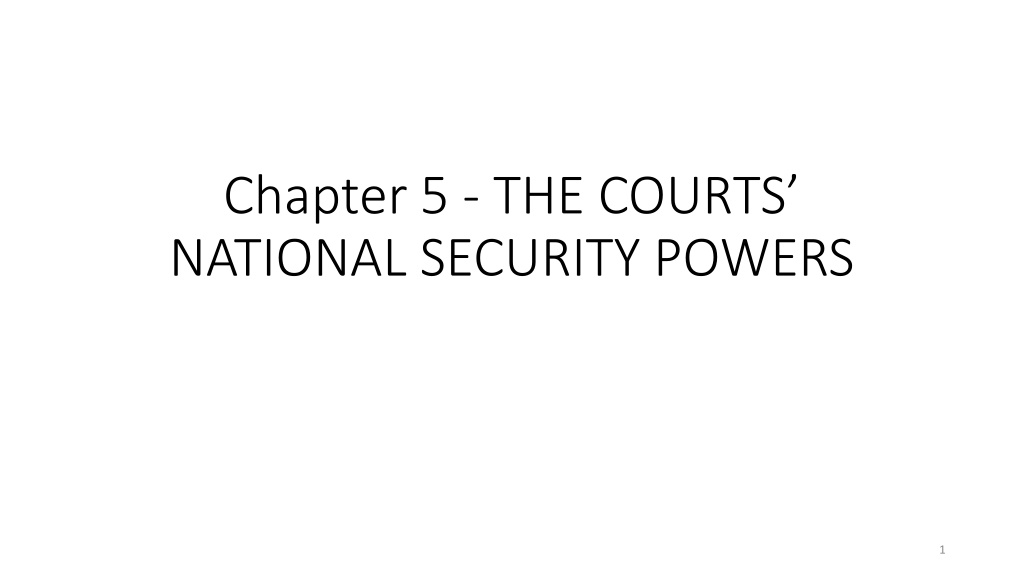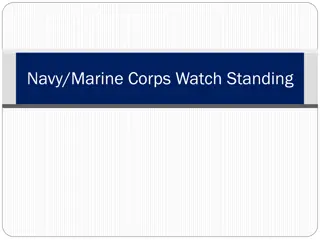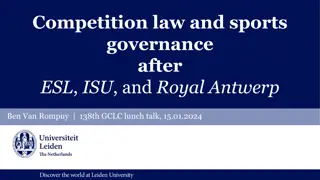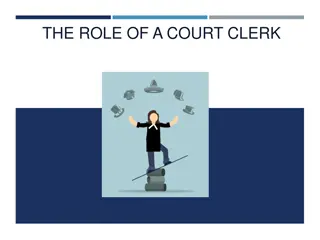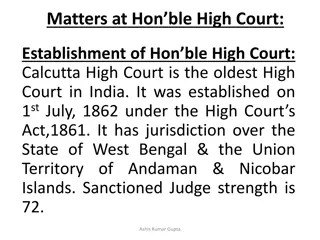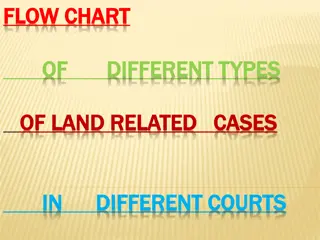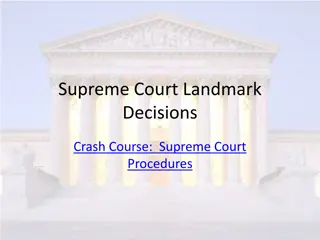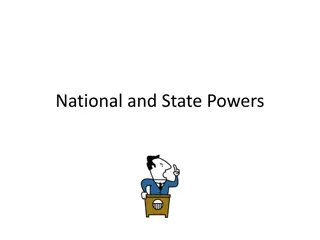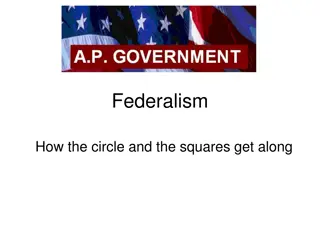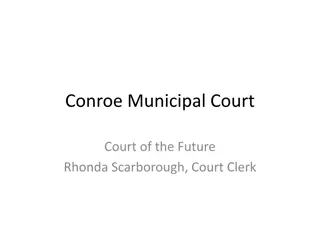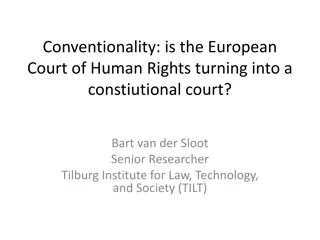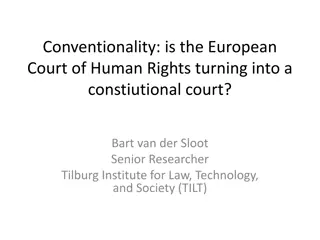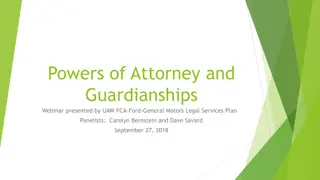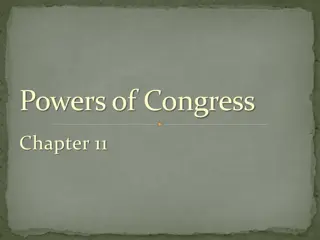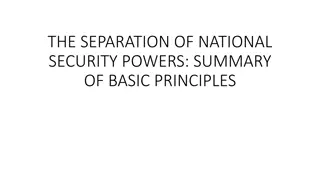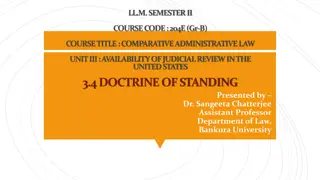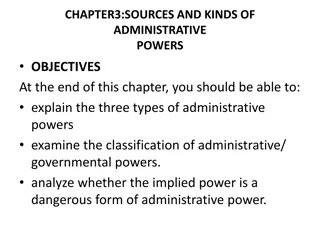National Security Powers and Basic Standing in Court Cases
In national security cases, the principle of basic standing remains applicable, requiring individuals to have suffered a genuine injury directly linked to the actions of the defendant. This ensures that only those with a valid legal interest can bring cases before the courts.
Download Presentation

Please find below an Image/Link to download the presentation.
The content on the website is provided AS IS for your information and personal use only. It may not be sold, licensed, or shared on other websites without obtaining consent from the author. Download presentation by click this link. If you encounter any issues during the download, it is possible that the publisher has removed the file from their server.
E N D
Presentation Transcript
Chapter 5 - THE COURTS NATIONAL SECURITY POWERS 1
Basic Standing Still Applies in National Security Cases (1) suffered an injury in fact, (2) that is fairly traceable to the challenged conduct of the defendant, and (3) that is likely to be redressed by a favorable judicial decision. Lujan v. Defs. of Wildlife, 504 U.S. 555, 560-61 (1992) This is complicated in national security cases by: Political question doctrine Sovereign immunity, unless waived Group versus individual injury (injury to all is injury to none) Pure claims of national security exceptionalism 2
Hamdi v. Rumsfeld, 316 F.3d 450 (4th Cir. 2003) Born in Baton Rouge, thus a US citizen. Allegedly captured on the battlefield in Afghanistan and detained as a terrorist in the United States. Government argued that his detention was unreviewable. The duty of the judicial branch to protect our individual freedoms does not simply cease whenever military forces are committed by the political branches to armed conflict. The Founders foresaw that troublous times would arise, when rulers and people would : : : seek by sharp and decisive measures to accomplish ends deemed just and proper; and that the principles of constitutional liberty would be in peril, unless established by irrepealable law. Ex parte Milligan, 71 U.S. (4 Wall.) 2, 120 (1866). While that recognition does not dispose of this case, it does indicate one thing: The detention of United States citizens must be subject to judicial review. [316 F.3d at 464.] 3
Washington v. Trump, 847 F.3d 1151 (9th Cir. 2017) Are national security related immigration actions unreviewable? There is no precedent to support this claimed unreviewability, which runs contrary to the fundamental structure of our constitutional democracy. See Boumediene v. Bush, 553 U.S. 723, 765 (2008) (rejecting the idea that, even by congressional statute, Congress and the Executive could eliminate federal court habeas jurisdiction over enemy combatants, because the political branches lack the power to switch the Constitution on or off at will ). Within our system, it is the role of the judiciary to interpret the law, a duty that will sometimes require the [r]esolution of litigation challenging the constitutional authority of one of the three branches. Zivotofsky ex rel. Zivotofsky v. Clinton, 566 U.S. 189, 196 (2012) (quoting INS v. Chadha, 462 U.S. 919, 943 (1983)). : : : It would indeed be ironic if, in the name of national defense, we would sanction the subversion of one of those liberties : : : which makes the defense of the Nation worthwhile. ); Zemel v. Rusk, 381 U.S. 1, 17 (1965) ( [S]imply because a statute deals with foreign relations [does not mean that] it can grant the Executive totally unrestricted freedom of choice. ). : : : [847 F.3d at 1161-1163. 4
Deferential Review Hamdi: The standards of the review are governed by Mathews v. Eldridge, an adlaw case that allows balancing due process against governmental interests and costs. (SC) In view of the knowledge, experience and positions held by the three [government] affiants regarding military secrets, military planning and national security, their affidavits were entitled to the utmost deference. Taylor v. Dep t of the Army, 684 F.2d 99, 109 (D.C. Cir. 1982) With no statute or regulation directly on point as guidance, the court has no standard for the review. This is often the case in national security law. The default in national security is deferential review. 5
Is the Court a Reliable Protector of Rights? Plessy v. Ferguson, 163 US 537 (1896), endorsing the framework for Jim Crow laws. Korematsu v. United States, 323 U.S. 214 (1944), upholding the exclusion of persons of Japanese ancestry (including U.S. citizens) from West Coast military areas out of deference to military judgment during World War II. Roman Catholic Diocese of Brooklyn v. Cuomo, 141 S. Ct. 63 (2020), limiting the power of the state to protect against the spread of the COVID virus and overturning 200 years of precedent that held that churches did not have special standing to resist orders protecting the public health. 6
Smith v. Obama Plaintiffs Claims The Plaintiff, Nathan Michael Smith, was deployed to Kuwait on an intelligence mission in Operation Inherent Resolve, the military campaign against the Islamic State of Iraq and the Levant (ISIL) initiated by the United States and its allies in 2014. He sought a declaration that the Operation was unlawful because Congress had not authorized it. Plaintiff also claims that the Take Care Clause requires President Obama to publish a sustained legal justification for Operation Inherent Resolve to enable Plaintiff to determine for himself whether this military action is consistent with his oath to preserve and protect the Constitution. The court reviews the argument that the war was justified under AUMF, but this is not necessary to resolve the case. 7
Standing and the Political Question The Court notes that the standing inquiry is especially rigorous when reaching the merits of the dispute would force [the Court] to decide whether an action taken by one of the other two branches of the Federal Government was unconstitutional. Raines v. Byrd, 521 U.S. 811, 819-20 (1997). Is this at issue to the extent that Plaintiffs claim depends on the President violating the War Powers Resolution? If the War Powers Resolution requirement of Congressional action is unconstitutional, it cannot be a basis for the Plaintiff s claims. The court does not want to resolve this unless necessary. 8
Plaintiff Fails to Raise Traditional Standing Injuries in Military Action Cases : : : Plaintiff does not allege the traditional types of injuries one might expect a service person challenging the legality of military action to allege. Plaintiff does not allege that he suffers any injury in the form of physical or emotional harms, or the risk thereof, associated with deployment to a theatre of combat. He also does not allege that he has been involuntarily forced to participate in a military action in violation of his own constitutional rights or liberties. And he does not allege that he has any moral or philosophical objections to the military action against ISIL. Indeed, Plaintiff has no qualms about participating in a fight against ISIL, and his lawsuit does not seek to relieve him of his obligation to do so. : : : 9
Plaintiffs Injuries First, Plaintiff alleges that he suffers legal injury because, to provide support for an illegal war, he must violate his oath to preserve, protect, and defend the Constitution of the United States. In addition, Plaintiff alleges that he is at risk of being punished for disobeying legally-given orders. : : : Are these concrete and particularized in Lujan sense? Is a concern about a future legal injury a legitimate injury under Lujan? Is the fear of future punishment for a risk of being required to violate an order sufficiently concrete? Would this standing have been stronger if he had refused to go? The court could have ended the case without any further discussion. 10
Little v. Barreme Does Not Require Plaintiff to Disobey Orders The underlying cause of action in Little was a trespass claim for improperly seizing the ship. Little stands for the proposition that a federal official [is] protected for action tortious under state law only if his acts were authorized by controlling federal law. The Little Court puts the captain in a bind: he must obey orders, but he can be sued for damages if the order is illegal. To the contrary, it appears well-settled in the post-Little era that there is no right, let alone a duty, to disobey military orders simply because one questions the Congressional authorization of the broader military effort. With the end of the prize system and subsequent case law, it becomes almost impossible to sue federal officials for civil damages. (Bivens) 11
When Can You Disobey an Order? Once civil liability is gone, the remaining question is criminal liability for obeying an illegal order. The duty to disobey an unlawful order applies only to a positive act that constitutes a crime that is so manifestly beyond the legal power or discretion of the commander as to admit of no rational doubt of their unlawfulness. In theory, this ends the Nuremberg Defense just following orders. In practice, in the US legal system, if someone in authority tells you that what you are doing is OK, you can probably dodge criminal liability because intent fails - you thought that what you were ordered to do was not really committing war crimes. 12
Plaintiff Does Not Have Standing Under the Oath of Office Cases These cases generally stand for the proposition that an official who has taken an oath to support the Constitution has standing to challenge a government action if he or she is then forced to choose between violating the Constitution and facing concrete harm. Who is really violating his oath of office, if the Plaintiff is right about the War Powers Resolution? [T]he alleged violation of the War Powers Resolution in this case is based solely on the alleged actions, or lack thereof, of President Obama, not Plaintiff. The same is true with regard to the alleged violation of the Take Care Clause. : : : Even accepting his allegations as true, he is not himself being ordered to violate the Constitution, and therefore his oath 13
Injury Claims in the Vietnam War Cases In the cases referred to by Plaintiff, plaintiff-service members claimed that they were being forced to fight in violation of their constitutional rights, and the injuries that they alleged were the deprivation of liberty and the risk of injury or death. See Berk, 429 F.2d at 304 (soldier ordered to dispatch to Vietnam alleging violations of his constitutional rights could bring suit challenging legality of war where the complaint can be construed as putting in controversy his future earning capacity, which serious injury or even death might diminish by an amount exceeding $10,000 ); Massachusetts v. Laird, 451 F.2d at 28 (soldiers serving in Southeast Asia had standing to challenge Vietnam War where [t]hey allege[d] that their forced service in an undeclared war is a deprivation of liberty in violation of the due process clause of the Fifth Amendment ). : : : 14
Plaintiff Does Not Allege Physical or Individual Liberty-Based Injuries Finally, the Court rejects Plaintiff s argument that the decisions in cases brought by service members challenging the Vietnam War further confirm [Plaintiff s] standing. To be sure, such cases do stand for the proposition that service men and women ordered into a war that they contend is illegal may have standing to challenge that war, and the Court finds the reasoning of those cases logical and persuasive. [While those soldiers got standing, they were not found to have a redressable claim and their cases were dismissed. No one got relief, only standing. That was also a more sympathetic court.] 15
Clapper v. Amnesty International USA, 568 U.S. 398 (2013) Human rights workers, labor union leaders, and journalists sought an injunction against secret, warrantless electronic surveillance of them, claiming violations of their First and Fourth Amendment rights. Because the plaintiffs were unable to obtain or present evidence that they were actually targeted for surveillance, however, the Supreme Court ruled that any injuries were too speculative to confer standing. Instead, they had to show that their imminent injury was certainly pending. Basically, they had to show that they were being personally surveilled, which they could only prove if they could get discovery which the court would never grant. 16
What if Your Client is on the Kill List? A foreign journalist alleged that the Trump administration had included him (on the basis of metadata from his communications, writings, social media postings, and travel) on SKYNET, [not that SKYNET] a classified list of potential terrorists, and that he was therefore probably on the kill list for targeted killing as well. The court held that: [w]hile it is possible that there is a correlation between a list like SKYNET and the Kill List, the Court finds no allegations in the Complaint that raise that possibility above mere speculation. Accordingly, the Court finds Mr. Zaidan has failed to allege a plausible injury-in-fact and therefore has no standing to sue. Same Clapper problem you cannot get discovery, so no proof. This is a recurring problem in national security cases. 17
Injuries by Illegally Supplied US Proxies Suppose, for example, that an American who had been injured in Yemen by a Saudi air raid sued the President and other executive branch defendants for supplying military aid to the Saudi Air Force in violation of a statutory ban on military assistance to Saudi Arabia. Even if he sufficiently asserted a concrete and particularized injury, a court might well rule that it was not caused by the defendants and not redressable by an injunction, because the Saudis could continue their air campaign in Yemen without U.S. aid. 18
Taxpayer or Citizen Standing In Pietsch v. Bush, 755 F. Supp. 62 (E.D.N.Y. 1991), a citizen taxpayer sought a court order preventing hostilities between the United States and Iraq before the 1991 Gulf War. According to the court, Pietsch s claim that he was being made an accessory to murder against his will, a compulsion causing him emotional distress, was too abstract to meet Article III requirements. Id. at 65-66. Indeed, with one equivocal exception, see Flast v. Cohen, 392 U.S. 83 (1968) (recognizing the standing of taxpayers to bring certain types of claims that government spending violates the Establishment Clause), the Supreme Court has generally rejected citizen or taxpayer standing even where no one would otherwise have standing to enforce the Constitution. 19
Congressional Standing A Congress member might get standing if denied the chance to vote by the President going to war without Congressional authorization, but this was mooted by a vote to support the President. Dellums v. Bush, 752 F. Supp. 1141 (D.D.C. 1990). You do not get standing to oppose something that you voted against and lost. Probably kills Dellums. Raines v. Byrd, 521 U.S. 811, 829 (1997). Once again, litigation is not a substitute for a losing vote in Congress. Campbell v. Clinton, 52 F. Supp. 2d 34 (D.D.C. 1999), aff d, 203 F.3d 19 (D.C. Cir. 2000). 20
United States House of Representatives v. Mnuchin, 976 F.3d 1 (D.C. Cir. 2020) - Standing The House sued Trump, claiming he violated the Appropriations Clause by using unappropriated money on the border wall. We already looked at the Appropriation Clause standing arguments in Chapter 4 21
Political Questions (Reviewed in Chapter 4) 22
Political Question Review: Baker v. Carr, 369 U.S. 186, 217 (1962) [1] a textually demonstrable constitutional commitment of the issue to a coordinate political department; or [2] a lack of judicially discoverable and manageable standards for resolving it; or [3] the impossibility of deciding without an initial policy determination of a kind clearly for nonjudicial discretion; or [4] the impossibility of a court s undertaking independent resolution without expressing lack of the respect due coordinate branches of government; or [5] an unusual need for unquestioning adherence to a political decision already made; or [6] the potentiality of embarrassment from multifarious pronouncements by various departments on one question. 23
Political Question Analysis How many do you need to make a case a political question? The constitution leaves setting immigration policy to Congress: Why wasn t I.N.S. v. Chadha, 462 U.S. 919 (1983) dismissed as a political question? Violations of the Constitution are not political questions. How does the standard for judging what is a political question resemble a mandamus proceeding? The key to mandamus is that there must be no discretion. The Court will not order the President to stop a national security action unless it is clearly outside his discretion. Lawyering tip: mandamus is almost never what your client needs. 24
Smith v. Obama The Political Question Plaintiff is asking the Court to interpret both the War Powers Resolution and Constitutional war making authority and find that the President is acting illegally. [My only question continues to be why this was not a summary dismissal.] For the reasons set out below, the Court finds that these are political questions under the first two Baker [v. Carr, 369 U.S. 186 (1962)] factors: the issues raised are primarily ones committed to the political branches of government, and the Court lacks judicially manageable standards, and is otherwise ill-equipped, to resolve them. Note if it is a political question, no one can litigate it. 25
Why War Powers are Always Political Questions There can be no doubt that decision-making in the fields of foreign policy and national security is textually committed to the political branches of government. It would be difficult to think of a clearer example of the type of governmental action that was intended by the Constitution to be left to the political branches : : : [than the] complex, subtle, and professional decisions as to the : : : control of a military force. : : : ; The fundamental division of authority and power established by the Constitution precludes judges from overseeing the conduct of foreign policy or the use and disposition of military power; these matters are plainly the exclusive province of Congress and the Executive. . 26
Ripeness The Final Hurdle to Stopping Presidential War Making In February 2003, active-duty members of the military, parents of military personnel, and members of Congress sued to enjoin the President from initiating a war against Iraq. Doe v. Bush, 323 F.3d 133 (1st Cir. 2003). The plaintiffs argued that Congress and the President are in collision that the President is about to act in violation of the October Resolution 27
The Purposes of the Ripeness Doctrine Ripeness doctrine involves more than simply the timing of the case. It mixes various mutually reinforcing constitutional and prudential considerations. One such consideration is the need to prevent the courts, through avoidance of premature adjudication, from entangling themselves in abstract disagreements. Another is to avoid unnecessary constitutional decisions. A third is the recognition that, by waiting until a case is fully developed before deciding it, courts benefit from a focus sharpened by particular facts. The case before us raises all three of these concerns. There is no violation until the attack, and then the case is moot. 28
Suing the United States for Money Damages A Brief Introduction 29
The Cases We Have Discussed So Far were Seeking Injunctions, Not Money Damages Injunctive relief most of what we see in cases challenging national security actions. Brought under the Administrative Procedure Act and/or the Constitution. Injunctions are prospective, to stop future wrongdoing. Injunctions do not involve individualized determinations of injury and compensation, and thus are not specific to the plaintiffs before the court. This allows them to be resolved on the law without extensive discovery and testimony. They do not raise sovereign immunity questions. 30
Tort Damage Claims Traditional Sovereign Immunity US Constitution "No Money shall be drawn from the Treasury, but in Consequence of Appropriations made by Law." U.S. Const. art. I, 9. No jurisdiction to sue in court. All compensation had to be by private bills What problems do private bills pose? 31
Constitutional Claims for Damages Takings under the 5th Amendment. Money owed through contracts with the United States. May be difficult to collect if you need classified information to prove the contract exists. Originally paid by special bills in Congress. 32
Court of Federal Claims 1855 Contracts, tax refunds, takings - not torts The intent was to regularize the process and end individual special bills by setting up a fund for paying claims. Administrative tribunal to review claims and make recommendations to Congress Later Congress made the decisions binding. Not an Art III court - like bankruptcy courts. Appeal to the Federal circuit and the United States Supreme Court. The Court of Federal Claims found the Corps liable for a taking because it did not protect New Orleans from Hurricane Katrina. The Federal Circuit overruled the holding and found no taking because the Federal Government has no duty to protect in the absence of a statutory or regulatory requirement. 33
Stopped here 34
Suing State Officials 42 USC 1983, part of the post-Civil War civil rights laws, allows persons who violate an individual s civil rights, while acting under the color of state law, to be sued in federal court. Thus, Congress authorized suing state officials for violating an individual s constitutional rights 100 years before the Supreme Court allowed the same claims to be made against federal officials. 35
Federal Tort Claims Act Congress authorizes tort claims against the federal government. 36
Federal Tort Claims Act Passed in 1946 All torts were private bills before then Tied up Congress and encouraged corruption Limited waiver of sovereign immunity to allow tort claims Congress appropriates a fund to pay the claims Since there is no federal common law of torts, the agency and court look to the law of the state where the tort occurred for the prima facie case for the tort. This is a waiver in derogation of sovereign immunity. This means that it is strictly construed: If you do not meet the letter of the statute, sovereign immunity is not waived, and you have no jurisdiction to sue. Louisiana abolished sovereign immunity, so if you fall outside the LA Tort Claims Act, you can sue with fewer limits than being under the Act. 37
Exceptions to the FTCA - 28 USC Sec 2680 http://biotech.law.lsu.edu/cases/immunity/ftca_exceptions.htm (h) originally did not allow suing federal law enforcement officers. Thus, individuals who were injured by negligent federal law enforcement officers could recover damages, but persons who were intentionally and wrongfully injured could not. This inconsistency drove the Supreme Court to issue the Biven ruling. After Bivens, Congress amends the FTCA to include intentional actions by federal law enforcement officers, but still excludes several intentional torts, such as false imprisonment. The Feres Doctrine prevents active duty military personnel from suing the United States. The FTCA specifically excludes military actions and any actions occurring outside the US. 38
FTCA Procedure and Discretionary Function Immunity You are not responsible for the details of the FTCA procedure, the learning objective for this section is to understand how difficult it is to sue the federal government for damages in general and specifically in national security related cases. 39
Administrative Procedural Requirements - Sec 2675 An action shall not be instituted upon a claim against the United States for money damages for injury or loss of property or personal injury or death caused by the negligent or wrongful act or omission of any employee of the Government while acting within the scope of his office or employment, unless the claimant shall have first presented the claim to the appropriate Federal agency and his claim shall have been finally denied by the agency in writing and sent by certified or registered mail. 40
Administrative Review of Claims Action under the FTCA - Sec 2672 The head of each Federal agency ... may consider, ascertain, adjust, determine, compromise, and settle any claim for money damages against the United States for injury or loss of property or personal injury or death caused by the negligent or wrongful act or omission of any employee of the agency while acting within the scope of his office or employment, under circumstances where the United States, if a private person, would be liable to the claimant in accordance with the law of the place where the act or omission occurred You do not litigate your tort directly in court, you litigate the agency s failure to provide administrative compensation for your injury. This is thought to make it impossible to maintain FTCA class action litigation. 41
Filing a Claim is Jurisdictional This is an administrative compensation scheme, so it is subject to exhaustion of remedies. You must file a claim with the agency within 2 years of the accident. You can only go to court after the agency rules on the claim or six months after filing the claim if the agency has not responded. "The failure of an agency to make final disposition of a claim within six months after it is filed shall, at the option of the claimant any time thereafter, be deemed a final denial of the claim for purposes of this section." If you do not comply with this requirement, your case will be dismissed and if the 2 years has elapsed, you will be prescribed/stature of limitations will bar the claim. 42
The Statutory Defense (Discretionary Function Exception) (a) Any claim based upon an act or omission of an employee of the Government, exercising due care, in the execution of a statute or regulation, whether or not such statute or regulation be valid, or based upon the exercise or performance or the failure to exercise or perform a discretionary function or duty on the part of a federal agency or an employee of the Government, whether or not the discretion involved be abused. Violations of statutes or regulations are not within discretion and make FTCA claims easy to prove if the other tort prima facie case elements are present. 43
What is the Intent of the DFE Defense? The DFE prevents using tort actions to question government policy. Individual government employees are immunized, and the federal government is substituted as the defendant, so individuals are not deterred from making hard decisions. If the act is intentional and lawful, the government is immune. Attorneys in private tort actions try to bolster damages by proving bad intent. This automatically triggers the DFE and leads to dismissal because it proves the elements of the DFE. The plaintiffs in the Katrina Levee Breach cases built their case on the theory that the Corps intentionally and knowingly built levees that would not adequately protect New Orleans. This assured that the case would be dismissed because it . 44
Breadth of the Discretionary Authority Exception Does the DFE allow the government to knowingly make a decision that hurts people and escape liability? Allen v. United States, 816 F.2d 1417 (10th Cir. 1987) 45
The Nuclear Test Site In 1950 the AEC chose an area in Nevada as a testing site. The President approved this choice. Thereafter, between 1951 and 1962, eight series of open-air tests were conducted, with the President approving each series of tests. Over one hundred atomic bombs were detonated. 46
Who Set the Standards for the Tests? Each test explosion was executed according to detailed plans which the AEC officially reviewed and adopted. Separate plans for protecting the public, and for providing the public with appropriate information, were also adopted by the AEC. 47
What is the Effect of Above Ground Nuclear Testing? There is a massive flash, shockwave, and radiation burst at ground zero the blast site. Radioactive particles fallout are blown into the atmosphere. Some have a short half-life, while others are long-lived. If ingested, they can lodge in the body and cause cancer, especially in children. There was real evidence of increased cancer risk downwind. 48
What are the Plaintiffs Claims? At trial, as a basis for governmental liability, plaintiffs singled out the alleged failure of the government, especially of the Radsafe Officers and the Test Information Officers, to fully monitor offsite fallout exposure and to fully provide needed public information on radioactive fallout. What would have been the effect if the government has told everyone that they were going to be exposed to dangerous, persistent contamination with radioactive material? 49
What Facts did the Trial Court Find? ...the trial court found that the people who designed the downwind safety program deviated from optimum practices based on the best available scientific knowledge. ...the trial court found the following deviations in the plans which would clearly support liability for injury under standard tort analysis as applied by the trial court. the decision to monitor randomly rather than on a comprehensive, person-specific basis, decisions not to use thyroid or whole body counters, decisions regarding the limited extent of urine, fecal, and blood sampling, the decision not to test milk samples in order to avoid arousing public concern, the decisions to forego internal fallout assessment from inhalation of fallout particles. 50
